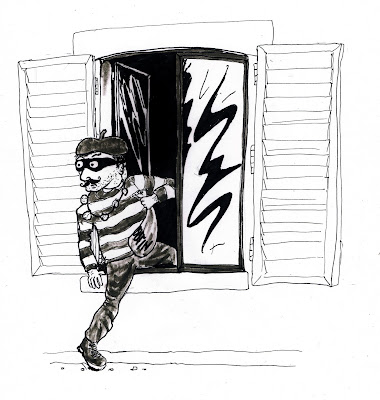It was wonderful to go away to France again the other week. It had been two years since my previous trip, and I had been missing it! A friend from school and I cooked up a plan to split a week between Grenoble and Lyon, and to take the new Eurostar service which runs directly from St Pancras station in London to Lyon Part-Dieu (Or did we go to Lyon just in order to use the new Eurostar service?).
 |
| Grenoble depuis la Bastille |
We looked down on Grenoble from the Bastille fortress to see how the city is set among the Alps ; in Lyon we saw the cathedral, took the funicular up to the basilica of Notre-Dame de Fourvière (an old devotion re-invigorated after Lyon was spared violence in the Franco-Prussian war of 1870), wandered at will around the Roman ruins and met a friend who is just beginning a year teaching at the ENS. We also made a day trip to Pérouges, a remarkable medieval village perched neatly on a hill-top like a board-game. (It even sounds like a board-game — ‘who fancies a game of Pérouges?’).
 |
| Your turn… up the stairs or down the street? |
As well as great monuments there were also smaller things to see: lesser elements of ordinary French life which struck me as being (sadly) absent from Britain. There was the quite calm, quite relaxed, quite sensible, quite self-unconscious group of young Grenoblois, about twelve or thirteen years old, on their way somewhere on a warm afternoon; there was the six- or seven-year-old boy perched on a climbing-frame in the Jardin Public, reading a bande déssinée (comic book). There was the game of boules in progress in the same garden. There was the man carrying six baguettes home on the funicular from Vieux-Lyon. There was the children’s library in Grenoble which, though adjacent to the main library, is advertised as a distinct bibliothèque de jeunesse with its own clientèle.
 |
| Another aspect of French life unavailable in Britain… |
This reverie might have been brought to an abrupt halt by the concession to pragmatism of new automatic checkouts in the local Monoprix, but then I saw an assistant directing the customers to the nearest free machine, steadfastly observing the old custom by which about shopkeepers and “chers clients” greet each other in shops with a “Bonjour, Monsieur” and – more significantly still – part with a “Merci, Monsieur, bonne soirée, au revoir.” I went on to see quiet but sincere patriotism in the Musée des Troupes de montagne (Museum of French Alpine troops), where the explanatory notes refer to these troops’ defence of ‘notre patrie’ (‘our homeland’). And sincere faith, too: I found out about the ‘pari sur une confiance totale’ made by the bishop of Grenoble, Guy de Kerimel, who has put a great effort into revamping his diocesan youth service. Isèreanybody (a pun on Isère, Grenoble’s département, and a slightly literal English translation of the French ‘il y a quelqu’un?’, ‘is anybody there?’), provides students and young professionals with their own chaplain and parish church, and maintains a vibrant presence on the new media, exactly as Benedict XVI asked.
There was the language too, of course: though they miss out on hearty Anglo-Saxon words like ‘stealthier’, ‘brought’ or ‘haven’, it is almost music. Here are the beginnings of a list of some of my favourite French words:
- gourmandise (f) – greed, gluttony, a plump and well-fed word.
- orgueilleux – proud (in the sinful sense), a word that is puffed out like the chest!
- fierté (f) – pride (not sinful!), a dignified, defiant word.
- grenouille (f) – a frog.
- plouf – splash (a different sound, but you end up just as wet)
- pamplemousse – grapefruit… a luscious, juicy word. Letters will run down your chin if you are not careful!
- moelleux – no translation! Soft, gooey, dark, molten, mellifluous. The best definition is the moelleux au chocolat (not to be clicked on during Lent).
- mie (f) – no translation here either! Bread’s doughier interior, which in France contrasts with the crumbling golden crust…
- veiller – to keep watch. A lovely, quiet, unobtrusive but steady word. There is a beautiful concision to the reply given by Frédéric Langlais, the hero of Paul Berna’s Le Carrefour de la Pie (‘Magpie Junction’), to his father when asked what he is doing up in the middle of the night: ‘Je veillais, chuchota Frédéric’ (“I was keeping watch,” whispered Frédéric). That is more poetry than prose. Paul Berna, a French children’s author who wove befriendable characters into realistic and beautifully-written books, ought to be much better known.
- lugubre – bleak, dim, gloomy, dismal.
- s’introduire (dans) – simply ‘to enter’, ‘to let oneself into’, but the French has a deliciously surreptitious and stealthy undertone. The subject of the sentence is definitely up to no good… ‘S’introduire dans les lieux’… to let oneself into the premises…

